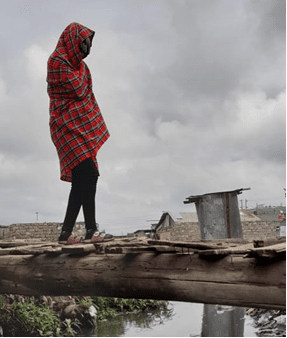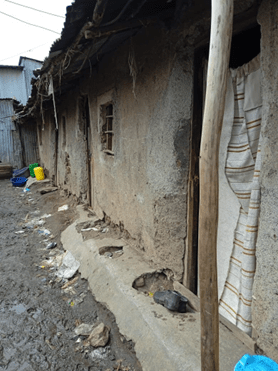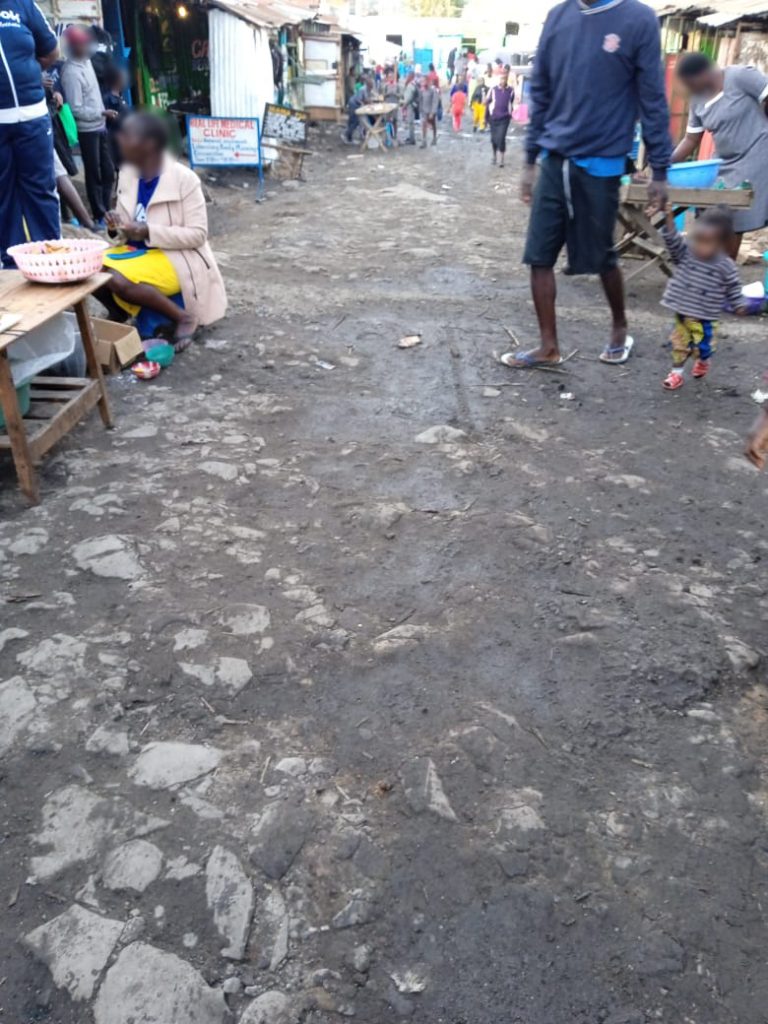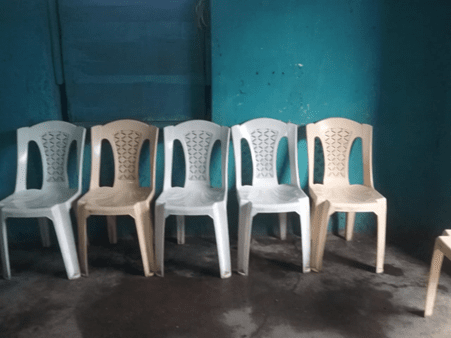Executive Summary
Background
Sexual and gender-based violence (SGBV) is a global health crisis. More than 730 million women worldwide have experienced physical or sexual violence at least once in their lifetime.[1] In Kenya, the Demographic and Health Survey of 2022 showed that 34 percent of women and girls[2] surveyed reported having experienced physical violence at least once in their lifetime and 13 percent reported having experienced sexual violence, with many of these cases going unreported to authorities.[3] SGBV has profound impacts on a survivor’s physical and mental health.[4] Access to mental health care is a major challenge for survivors of sexual violence.[5]
In Kenya, 34 percent of women and girls aged 15-49 years surveyed have experienced physical violence at least once in their lifetime and 13 percent have experienced sexual violence, with many of these cases going unreported. SGBV has profound impacts on survivors’ physical and mental health, and access to mental health care is a major challenge for survivors of sexual violence.

Physicians for Human Rights’ Program on Sexual Violence in Conflict Zones began working in Kenya in 2011 to confront impunity for sexual violence committed during the unrest that followed the 2007 national elections.
From 2020 to 2022, PHR worked with partners, including the Survivors of Sexual Violence Network in Kenya (SSVKenya) convened by the Wangu Kanja Foundation, to address challenges faced by survivors. These included medical-legal documentation of the mental health impacts of sexual violence and access to quality mental health services in Kenya. The project, supported by the Comic Relief & UK Aid Mental Health Programme, aimed to enhance the capacities of health professionals and institutions in Kenya to provide post-rape mental health care and to forensically document the mental health impacts of sexual violence, as well as to strengthen the legal and policy framework on mental health care in Kenya.
This assessment arose out of PHR’s interest in understanding the impact of these interventions and related advocacy from the perspective of survivors of sexual violence, themselves. To ensure the voices of survivors remained at the heart of the assessment, PHR partnered with SSVKenya, an advocacy coalition comprised of survivors of sexual violence in Kenya.


Methodology
To conduct the assessment, PHR and SSVKenya jointly identified 10 survivors of sexual violence from across Nairobi who lived in areas that benefitted from the intervention, were active in SSVKenya, and were engaged in their communities as activists, human rights defenders, and volunteers helping other survivors access health services.
The assessment team selected Photovoice – a participatory action research (PAR) methodology through which community members document their experiences using photography – as well as voice recordings for this assessment.
The use of this methodology reflected a deliberate choice to empower survivors and mitigate the risk of re-traumatization that is inherent in traditional, interview-driven methodologies. The assessment team included self-selected survivors who were motivated to document issues important to them and their community and three PHR staff members. Using this methodology, survivors were equal partners in the assessment.[9],[10]

The assessment team selected Photovoice – a participatory action research (PAR) methodology through which community members document their experiences using photography. Using this methodology, survivors were equal partners in the assessment.
Findings
The assessment team took a total of 223 photos during a one-week period in October and November 2022 representing their experiences accessing mental health services in Nairobi. These photos were accompanied by a total of 99 WhatsApp voice notes.
Analysis of these materials, conducted by the assessment team and the survivor-collaborators, showed that survivors perceived gaps in the availability, accessibility, acceptability, and quality (AAAQ) of mental health services. As the AAAQ are the essential elements to realizing the right to health, they provide a powerful framework to understand sexual violence-related mental health services from a rights-based perspective.[12]
Availability
Survivors said mental health services for survivors of sexual violence are often unavailable in their communities, due to closed facilities, missing staff, or infrastructure challenges. They said there is minimal prioritization of mental health care services in general, and specifically of services targeting survivors of SGBV and other vulnerable groups.
Accessibility
Survivors identified difficulties accessing mental health services across Nairobi, with transportation a major challenge. They also experienced challenges accessing private facilities, primarily due to the high cost of mental health services and medication.
Acceptability
Survivors felt that many services being offered were not acceptable for their particular needs, including lack of private spaces for counselling sessions. They feared breaches of confidentiality and others learning about their history of sexual violence. They also noted challenges in accessing survivor-centered care, including the fact that providers multitasked during care.
Survivors said mental health services for survivors of sexual violence are often unavailable in their communities, due to closed facilities, missing staff, or infrastructure challenges.
Quality
Survivors frequently reported challenges related to the quality of services being offered. They shared their doubts regarding the skill level of health professionals on providing mental health services and how to engage with survivors of sexual violence. Survivors saw challenges in the implementation of existing policies and standards ensuring quality care in their areas.
Kenya has a clear obligation under national laws and policies to address these gaps and provide high quality, accessible, acceptable, and available mental health care. The Constitution of Kenya affirms that “every person has the right to the highest attainable standard of health.”[13] The Mental Health Amendment Act’s 2022 revisions state that survivors of sexual violence are entitled to access affordable mental health services in Kenyan health facilities.[14] The Sexual Offences Act Medical Regulations operationalize the provisions of the Sexual Offences Act and provide a legal foundation for access to no-cost post-rape care, which includes mental health services (i.e., counselling) for survivors of sexual violence.[15] The National Guidelines on Management of Sexual Violence in Kenya[16] provide guidance on the survivor-centered implementation of health services for survivors, including mental health services. This solid legal framework provides a robust platform from which Kenya’s national and local governments can implement existing laws to realize the right to mental health of survivors of sexual violence. Despite the strong domestic legal and policy landscape for the provision of mental health care for survivors of sexual violence, there is a gap in the implementation of these policies.
Finally, the government of Kenya, as a party to international human rights treaties and obligations – including the International Covenant on Economic, Social and Cultural Rights, the Convention on the Elimination of All Forms of Discrimination against Women, the African Charter on Human and Peoples’ Rights, and the Protocol to the African Charter on the Rights of Women in Africa (the Maputo Protocol) – is obligated to ensure that all sexual violence-related care (including mental health care) is provided in line with the AAAQ framework and should address obstacles to the realization of these standards.
Survivors perceived gaps in the availability, accessibility, acceptability, and quality of mental health services. They said there is minimal prioritization of mental health care services in general, and specifically of services targeting survivors of SGBV and other vulnerable groups.
Conclusion and Recommendations
This assessment not only deepened understanding of the perceptions of survivors of sexual violence about the challenges they face in accessing mental health services, but it also prioritized the engagement of survivors in advocating for change in their communities. This enables the results of this assessment to contribute to action and advocacy efforts. Finally, this assessment shows that Photovoice, as an example of a participatory research and evaluation method, can be a powerful tool to ensure that survivors of sexual violence can remain in the center of assessments, research, and evaluations conducted to understand their experiences.
Based on the assessment’s results, PHR and the Survivors of Sexual Violence Network in Kenya offer the following recommendations:
To all stakeholders, including national and county governments and civil society organizations:
▪ Ensure that measures are taken to engage survivors’ perspectives and ensure that their voices are included, listened to, and heard in processes to improve mental health services for survivors. This includes ensuring that survivors of sexual violence are able to engage at public meetings at the sub-county, city, national and other levels. Stakeholders must proactively engage survivor networks, such as the Survivors of Sexual Violence Network in Kenya, when developing laws, policies, and programs meant for survivors. Finally, stakeholders should leverage participatory methods to engage survivors to integrate survivor priorities in the design of polices and legislation.
▪ Engage in reparations and transitional justice processes to ensure the inclusion of mental health care and services for survivors of sexual violence, as part of survivor-centered and holistic reparations.
To the Nairobi City County Government:
▪ Prioritize the establishment of the Mental Health Council as per the provisions of the Mental Health Amendment Act. The council should include experts in mental health and representatives of survivors’ groups to ensure that the specific mental health needs of survivors of sexual violence are represented on the council. They should be required to maintain a register of all private mental health facilities operating within their counties and submit these to the Mental Health Board annually. They should also be mandated to inspect these facilities and report their findings to the Mental Health Board for remedial action that may be necessary.
▪ Allocate more financial resources to mental health service provision and increase the number of staff offering mental health services. Dedicate additional funding and conduct annual capacity development for all health care providers on the provision of mental health services to ensure all are equipped with the skills to provide trauma-informed, survivor-centered initial mental health support, forensic psychological documentation, and referrals as needed.
▪ Strengthen the integration of mental health service provision into routine and primary health care, including ensuring that primary health care providers can identify and refer survivors of sexual and gender-based violence (SGBV) to mental health services.
▪ Fully implement the National Guidelines on Management of Sexual Violence in Kenya at health facilities that provide post-rape care, with particular emphasis on provisions of the guidelines that enhance the survivor-centered aspects of mental health-related service delivery, including ensuring privacy.
▪ In line with the Sexual Offenses Act Medical Regulations and The Nairobi City County SGBV Management and Control Bill, allocate county health funds to guarantee no-cost post-rape care and affordable mental health care for priority populations.
▪ Ensure that mental health providers are available to provide services during the hours of clinic operation.
▪ Train and engage community mental health workers to offer appropriate first-line mental health services to and referrals for survivors of sexual violence. This should include new and formal programs with survivors’ networks to provide peer support and engagement with other survivors.
▪ Conduct public education campaigns to create awareness on the importance of mental health care, psychosocial support, and the mental health impacts of SGBV in order to address community level stigma, discrimination, and negative attitudes related to mental health care and treatment that prevent many survivors from accessing services. This should include dissemination of information on the mental health services that are available to survivors, which clinics offer mental health services, hours of operation, and which services are free of charge.
▪ Develop new programs to ensure mental health services are more accessible to survivors of sexual violence. This should be done by providing transportation or transportation stipends to ensure survivors can return for mandated follow-up counselling sessions. Develop programs to offer home-based, online, virtual, or phone-based counselling services or at the community level to reduce the physical, logistical, and financial barriers to accessing mental health services.
▪ Ensure that health facilities and locations for mental health services are accessible and user-friendly. Additionally, provide wheelchairs, ramps, and signs that indicate where facilitates are located, and update publicly available information about when service providers will be available to provide services.
▪ Ensure that the privacy of survivors of sexual violence seeking mental health is protected at all public facilities, in line with the National Guidelines on Management of Sexual Violence. This should include access to private and separated treatment rooms where survivors can access services without fear of disclosure or interruption.
To the Ministry of Health:
▪ Prioritize the provision of trauma-informed, survivor-centered mental health services for survivors of SGBV, including, specifically, mental health counseling and access to psychological assessments, where needed, to capture critical evidence of sexual violence.
▪ Further develop and implement guidelines and protocols for the health sector on the provision of comprehensive mental health services to SGBV survivors. Specifically, expedite the adoption of the rules and regulations that will operationalize the Mental Health Amendment Act 2022, including ensuring access to mental health care without discrimination.
▪ Design, fund, and implement comprehensive training, campaigns, and awareness-building on the importance of mental health care for survivors of sexual violence for all health care workers, as well the scope and nature of legal obligations and national and international standards on the provision of such care. Develop standardized training materials and continuous medical education courses for health care workers to provide survivor-centered, trauma-informed mental health services and psychosocial to support survivors of sexual violence. This training should be conducted simultaneously with the development/implementation of facility and community health protocols to support the management of SGBV survivors.
▪ Through the National Treasury, allocate resources to county governments for the training, recruitment, and deployment of well-trained mental health service providers.
▪ Ensure the availability of funds at the county level and undertake monitoring to ensure survivors can meaningfully access no-cost services for post-rape care, including psychological assessments and mental health care, as mandated by the Sexual Offenses Act Medical Regulations. Increase the budgetary allocation to mental health services to, at a minimum, the recommended WHO standards at the national level.
▪ Undertake and fund additional assessments, research, and data collection on the impact of sexual violence on survivors’ mental health to be used to increase the accessibility, availability, acceptability, and quality of mental health services for survivors of sexual violence.
▪ Implement accountability processes at the national and county levels to monitor and evaluate the provision of high-quality, acceptable, available, and accessible mental health care for survivors of SGBV, without discrimination, and provide redress and remedy where survivors face barriers in accessing such care, including investigations by the Kenya National Commission on Human Rights where there are suspected violations of rights related to the mental health care of survivors.
▪ Ensure targeted implementation of the existing laws, including the Constitution of Kenya (article 43) and the Mental Health Amendment Act, to ensure that the right to the highest attainable standard of health is realized.
To Donors:
▪ Continue to support survivor’s groups and programs that provide mental health care for survivors, including capacity development for service providers on mental health care, survivor-centered approaches, and psychological documentation.
▪ Support programs that use participatory approaches to engage survivors in assessments, research, and monitoring and evaluation.
To organizations conducting assessments, research, and monitoring and evaluation with survivors of sexual violence:
▪ Use participatory research and evaluation methods, such as Photovoice, to leverage their utility as powerful tools that ensure survivors of sexual violence remain in the center of assessment, research, and monitoring and evaluation conducted with the aim of understanding survivor experiences and producing recommendations that will result in changes in spaces that matter most to survivors.
Acknowledgements
This assessment was written by staff members of Physicians for Human Rights’ (PHR) Program on Sexual Violence in Conflict Zones, Thomas McHale, SM, deputy director, Suzanne Kidenda, senior program officer- Kenya, and Olivia Dupont, MPH, program manager; and Millicent Akinyi, Jane Alfayo, Mercy Etole, Grace Kamau, Beatrice Karore, Margaret Kinyua, Ashura Mciteka, Diana Mushiyi, Lorraine Ong’injo, and Bonila Sisia, members of the Survivors of Sexual Violence in Kenya Network.
The assessment benefitted from review by PHR staff, including Erika Dailey, MPhil, director of advocacy and policy, Christian De Vos, JD, PhD, director of research and investigations, Lindsey Green, MA, senior program officer, Karen Naimer, JD, LLM,
MA, director of programs, Naitore Nyamu-Mathenge, LLM, MA, Kenya head of office, Dr. Ranit Mishori, MD, MHS, FAAFP, senior medical advisor, Payal Shah, JD, director, Program on Sexual Violence in Conflict Zones, Kevin Short, deputy director of media and communications, and Saman Zia-Zarifi, JD, LLM, executive director. The assessment was strengthened through external review by Donna Shelley, MD, MPH. It was reviewed, edited, and prepared for publication by Claudia Rader, MS, PHR senior communications consultant, with assistance from Samantha Peck, PHR executive and program associate and board liaison.
PHR would like to thank Rutgers International for sharing curriculum materials that were adapted and used for Photovoice trainings in this project. This innovative assessment would not have been possible without the generous support of the Comic Relief & UK Aid Mental Health Programme.
Above all, PHR is grateful to partners from the Survivors of Sexual Violence in Kenya Network (SSVKenya) who shared their time, stories, and photographs with us, and for the partnership with SSVKenya, whose members continue to passionately represent the priorities of survivors in Kenya and beyond.
Citations and Endnotes
[1] “Facts and Figures: Ending Violence against Women,” UN Women – Headquarters, https://www.unwomen.org/en/what-we-do/ending-violence-against-women/facts-and-figures.
[2] This statistic only includes women and girls aged 15-19 who were usual members of (or slept at the night before) households sampled as part of the Kenya Demographic and Health survey, 2022.
[3] Kenya National Bureau of Statistics, Ministry of Health/Kenya, National AIDS Control Council/Kenya, Kenya Medical Research Institute, and National Council for Population and Development/Kenya, 2023, Kenya Demographic and Health Survey 2022, Rockville, MD, USA: Available at https://dhsprogram.com/pubs/pdf/PR143/PR143.pdf.
[4] “WHO Multi-Country Study on Women’s Health and Domestic Violence against Women,” n.d.
[5] Nikram Patel, Neerja Chowdhary, Atif Rahman, and Helen Verdeli, 2011, “Improving Access to Psychological Treatments: Lessons from Developing Countries,” Behaviour Research and Therapy 49 (9): 523–28. https://doi.org/10.1016/j.brat.2011.06.012.
[6] Survivor-collaborator quote, Data collection period October 28 – November 4, 2023.
[7] Survivor-collaborator quote, Data collection period October 28 – November 4, 2023.
[8] Survivor-collaborator quote, Data collection period October 28 – November 4, 2023.
[9] M. Candace Christensen, 2017, “Using Photovoice to Address Gender-Based Violence: A Qualitative Systematic Review,” Trauma, Violence, & Abuse, July, 152483801771774, https://doi.org/10.1177/1524838017717746.
[10] “Using Photovoice to Address Gender-Based Violence: A Qualitative Systematic Review.”
[11] Survivor-collaborator quote, Data collection period October 28 – November 4, 2023.
[12] Office of the UN High Commissioner for Human Rights, “The Right to Health Fact Sheet,” https://www.ohchr.org/Documents/Issues/ESCR/Health/RightToHealthWHOFS2.pdf.
[13] Constitution of Kenya 2010, Article 43(1). n.d., http://kenyalaw.org/kl/index.php?id=398.
[14] “The Mental Health Act,” Kenya, 2022.
[15] “Sexual Offences Act Medical (Treatment) Regulations,” Kenya, 2020.
[16] Nairobi, Ministry of Health, 2014, National Guidelines on Management of Sexual Violence in Kenya.


